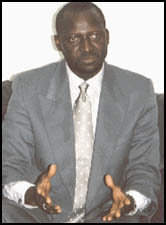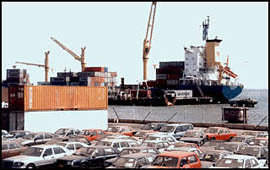 ECONOMY AND FINANCE ECONOMY AND FINANCE |

The Gambia is subscribing to prudent fiscal policies and conservative monetary management that is designed to address the weaknesses in the economy, hold inflation at 2.5%, contain the external current account deficit below 10% of GDP and maintain an external reserve of about five months and a half of import cover. The objective should also see an increase in government savings, establish full budgetary transparency, reduce the domestic debt burden and qualify for debt relief under the HIPC initiative. The pressure of debt service payment on the budget has been a drain on the limited resources for development. With the envisaged 67% debt relief, the augury could change. "The challenge is that we go through the debt relief program successfully and that the money gets allocated to the right projects designed for the development of the local population" . State Secretary Jatta believes that poverty alleviation is central to economic development "we must lift our people out of the shackles of poverty and empower them to take active roles in developing the nation", he noted.
There are also tremendous efforts to modernise The Gambia's economy and endow it with the attractive indices for increasing economic activity. There's an accelerated depreciation of taxes already in place, a single swing corresponding to a three-year depreciation saw company tax reduced by 15% and the effort is just unfolding. However, at 35%, company tax is still deemed high. Explaining that further reduction could only make the country more attractive, Pa Njie, Trust Bank Managing Director argues, "more incentives should be accorded investors in order to attract more foreign investments." Import rates have been reduced with ranges from 0 to 18% of tariff bands. The government also reduced public borrowing with a view to improving the efficiency of financial intermediation while the other tier of this financial reform would be stimulating the development of secondary markets. Real interest rates are beginning to fall and there are indications that the trend is for real.
| 
All these structures are no fluke; they are aimed at enhancing The Gambia's competitiveness and attracting foreign investments. "Foreign investors must look at the comparative advantages of The Gambia vis-à-vis the sub-region", posits Jatta, "as a small country surrounded by bigger ones, we understand that we must be very efficient to survive. Our duties and tariffs are very low, our port facilities are very efficient and the Gambia is the only country where goods can be cleared in just 24 hours".
A new comprehensive divestiture strategy, the primary focus of which is to roll back the frontiers of the state through withdrawal from activities best suited for private sector operation has been adopted. It follows a sequential approach to strengthen priority areas while moving forward with privatisation. Like divestiture, diversification of economic activity is a priority.
With sound macroeconomic practises, poverty alleviation, competitive inducements such as the implementation of the National Industrial Policy (NIP), and the integration of the investment code into the tax system. The export processing zones, tariff and tax reforms, revitalisation of the groundnut sub-sector, standard sea and airport facilities and Economic Reform Support Operations with World Bank, The Gambia can truly hope to achieve substantial economic and industrial development.
Its strategies may yet be slow, but they are steady, and even with the turbo-charged motion of globalisation, slow and steady might still win the race.unemployment and minimize the population drift from rural areas to Banjul. |

